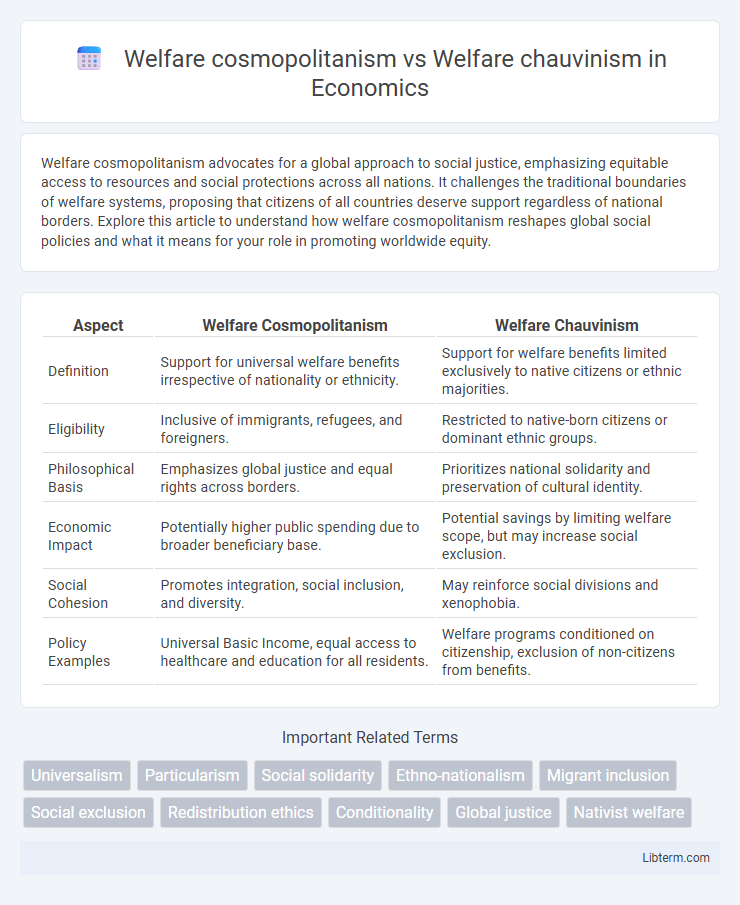Welfare cosmopolitanism advocates for a global approach to social justice, emphasizing equitable access to resources and social protections across all nations. It challenges the traditional boundaries of welfare systems, proposing that citizens of all countries deserve support regardless of national borders. Explore this article to understand how welfare cosmopolitanism reshapes global social policies and what it means for your role in promoting worldwide equity.
Table of Comparison
| Aspect | Welfare Cosmopolitanism | Welfare Chauvinism |
|---|---|---|
| Definition | Support for universal welfare benefits irrespective of nationality or ethnicity. | Support for welfare benefits limited exclusively to native citizens or ethnic majorities. |
| Eligibility | Inclusive of immigrants, refugees, and foreigners. | Restricted to native-born citizens or dominant ethnic groups. |
| Philosophical Basis | Emphasizes global justice and equal rights across borders. | Prioritizes national solidarity and preservation of cultural identity. |
| Economic Impact | Potentially higher public spending due to broader beneficiary base. | Potential savings by limiting welfare scope, but may increase social exclusion. |
| Social Cohesion | Promotes integration, social inclusion, and diversity. | May reinforce social divisions and xenophobia. |
| Policy Examples | Universal Basic Income, equal access to healthcare and education for all residents. | Welfare programs conditioned on citizenship, exclusion of non-citizens from benefits. |
Introduction to Welfare Cosmopolitanism and Welfare Chauvinism
Welfare cosmopolitanism advocates for inclusive social policies that extend welfare benefits to immigrants and global citizens, emphasizing universal human rights and shared economic responsibilities. In contrast, welfare chauvinism restricts social welfare to native-born citizens, promoting nationalistic and exclusionary approaches to social protection. These opposing ideologies reflect fundamental debates on social justice, migration, and the scope of welfare state obligations in increasingly diverse societies.
Historical Origins of Welfare Attitudes
Welfare cosmopolitanism emerged from post-World War II internationalism, emphasizing inclusive social policies based on universal human rights and global solidarity. In contrast, welfare chauvinism has roots in nationalist and protectionist movements of the late 19th and early 20th centuries, advocating welfare benefits exclusively for native-born citizens or specific ethnic groups. These historical attitudes reflect divergent views on social cohesion, with cosmopolitanism promoting cross-border welfare obligations and chauvinism prioritizing national identity in social resource allocation.
Core Principles of Welfare Cosmopolitanism
Welfare cosmopolitanism emphasizes universal social rights and equal access to welfare benefits regardless of nationality, promoting global solidarity and inclusion. It advocates for policies that address global inequalities and support migrants, refugees, and marginalized communities as part of a shared humanity. The core principles include non-discrimination, cross-border social justice, and the expansion of welfare entitlements beyond national boundaries.
Foundations of Welfare Chauvinism
Welfare chauvinism is grounded in the belief that social welfare benefits should be restricted to native-born citizens, asserting that immigrants and ethnic minorities drain public resources. This ideology draws from nationalist and exclusionary principles, emphasizing cultural homogeneity and prioritizing the in-group's economic security. Contrasted with welfare cosmopolitanism, which advocates for inclusive social policies regardless of nationality, welfare chauvinism seeks to preserve welfare state resources for the indigenous population alone.
Social and Political Drivers of Each Approach
Welfare cosmopolitanism is driven by social values of inclusivity, global solidarity, and human rights, promoting universal access to welfare regardless of nationality. Political drivers include progressive policies and international cooperation advocating for migrants and marginalized groups' protection within welfare frameworks. Welfare chauvinism, fueled by nationalist and protectionist social attitudes, emphasizes prioritizing native citizens in welfare distribution, supported by political agendas stressing sovereignty, cultural homogeneity, and resource competition.
Comparative Analysis: Eligibility and Access
Welfare cosmopolitanism advocates for inclusive social benefits, extending eligibility and access to migrants, refugees, and non-citizens based on universal human rights principles. Welfare chauvinism restricts welfare benefits primarily to native-born citizens, limiting access through stringent residency requirements or citizenship status to protect national resources from perceived external strain. Comparative analysis reveals that cosmopolitan policies enhance social cohesion and economic integration by promoting broader eligibility, whereas chauvinistic approaches prioritize national identity and social exclusion, often leading to increased inequality and marginalization.
Impacts on Marginalized and Migrant Populations
Welfare cosmopolitanism promotes inclusive social policies that extend benefits and protections to marginalized and migrant populations, enhancing their access to healthcare, education, and social security. In contrast, welfare chauvinism restricts social welfare primarily to native-born citizens, often excluding migrants and minorities, which exacerbates social inequalities and contributes to their economic and social marginalization. These divergent approaches significantly influence the integration, well-being, and social cohesion of vulnerable groups within diverse societies.
Public Opinion and Political Rhetoric
Public opinion on welfare cosmopolitanism emphasizes inclusivity and global solidarity, advocating for social welfare policies that extend benefits to immigrants and refugees. Conversely, welfare chauvinism appeals to nationalist sentiments, arguing that welfare resources should prioritize native citizens, a stance frequently reinforced through political rhetoric that frames outsiders as competition for limited social benefits. Political parties leveraging welfare chauvinism often amplify fears about immigration to gain support, while proponents of welfare cosmopolitanism highlight humanitarian obligations and economic interdependence in their discourse.
Policy Outcomes in Global Contexts
Welfare cosmopolitanism promotes inclusive social policies that extend benefits to immigrants and global citizens, resulting in more equitable access to healthcare, education, and social security across diverse populations. In contrast, welfare chauvinism restricts welfare benefits to native-born citizens, often leading to increased social exclusion and marginalization of immigrant communities. Empirical studies indicate that cosmopolitan welfare models correlate with higher social cohesion and poverty reduction in multicultural societies, whereas chauvinistic approaches tend to exacerbate inequality and social fragmentation.
Future Trends and Policy Recommendations
Welfare cosmopolitanism emphasizes inclusive social policies that extend benefits to all residents regardless of nationality, promoting social cohesion in increasingly diverse societies. Future trends suggest growing challenges due to migration dynamics and economic inequalities, requiring adaptive frameworks that balance universal welfare with local resource constraints. Policy recommendations include investing in integrative programs, enhancing cross-border cooperation, and developing targeted support systems to ensure equitable access while maintaining fiscal sustainability.
Welfare cosmopolitanism Infographic

 libterm.com
libterm.com